.png)
If you’ve already read our blog on treating and overcoming sleep apnea, you know that sleep apnea is a common disorder with potentially serious implications. While sleep apnea symptoms may seem mild at first, over time, obstructive sleep apnea may eventually lead to increased blood pressure, heart disease, liver disease, depression, and more.
But when sleep apnea is combined with other conditions like chronic obstructive pulmonary disease (COPD) , it’s often a two-way road. According to a new study called Canadian Cohort Obstructive Lung Disease (CanCOLD), sleep disruptions — like those experienced in sleep apnea — could lead to a greater risk of long-term COPD exacerbations.
Led by researchers at Montreal’s McGill University, this ongoing study aims to analyze over 2,000 Canadians with mild to severe COPD. Whereas previous trials have shown that COPD symptoms may lead to sleep disturbances, this study will help medical professionals better understand the characteristics of COPD and how they’re affected by a poor night’s sleep.
Using the Pittsburgh Sleep Quality Index (PSQI) and negative binomial regression, the team observed data from 480 participants over an 18-month assessment period. During this time, 185 of the participants experienced at least one exacerbation and 203 had a baseline PSQI score over five, indicating that the participant had a poor night’s sleep. The study also concluded that both symptom- and event-based exacerbation risks were associated with a higher PSQI score.
{{cta('fa8abc2a-1e88-4fa3-82fd-1cb5b9ed43b2','justifycenter')}}
What We Can Take Away From The Study
When it comes to other major causes of death like cancer and heart disease, COPD awareness remains low both in the United States and around the world. Studies on COPD are often overshadowed by discussions about lung cancer and other respiratory conditions. However, this study may help bring some much-needed awareness to a condition that so many people suffer with.
Unlike acute illnesses, chronic conditions like COPD progress slowly and oftentimes without any cause for concern. You may have started to develop COPD years ago but brushed off your symptoms as “getting old” or “being out of shape.” This study reaffirms the importance of getting checked regularly for both healthy lung function and sleep quality.
Sleep Quality Matters
It’s easy to dismiss a bad night’s sleep as unimportant or insignificant, but when this issue persists, it’s almost always linked to an underlying condition. And even when it isn’t, feelings of restlessness and chronic fatigue can have an impact on the severity and frequency of your COPD symptoms and exacerbations. What’s more, if you’re sleepy frequently, it will make it significantly more difficult to deal with the daily struggles of managing COPD.
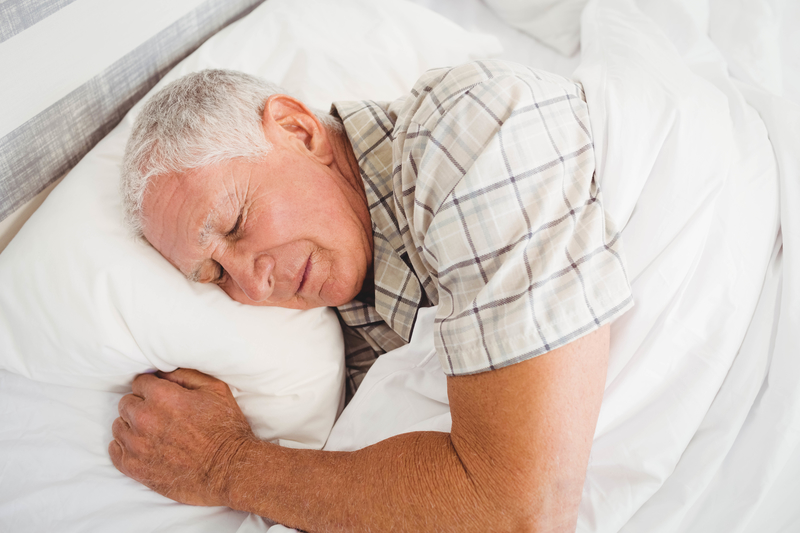
As such, it’s important to take all necessary precautions to ensure that you sleep well and aren’t disturbed. First and foremost, you should make sure that you get an adequate amount of sleep each night. According to the National Sleep Foundation, adults between the ages of 24 and 64 should get between 7 to 9 hours of sleep and anyone older than 65 should get at least 7 to 8 hours of sleep. Let’s take a look at some tips for getting a better night’s sleep.
Sleep-Wake-Time Consistency
Researchers have studied sleep extensively and one of the most common rules they stress is creating a sleep routine and sticking with it. Many people will tell you that you need to get up as early as possible and that staying up late is a problem. But in reality, you simply want to pick a schedule and follow it every day of the week.
Avoiding Screens Before Bed
Technology helps us all lead more productive lives and has allowed us to learn more about the world than any other time in human history. But staring at a screen right before bed may have the opposite effect. According to the National Sleep Foundation, using electronics before bed delays the circadian rhythm in your body and slows the release of melatonin (the sleep-inducing hormone in the brain) making it harder to fall asleep when you need to.
Calcium and Magnesium Levels
Magnesium is an essential mineral that’s responsible for 300 biochemical reactions in the body. It’s one of the most important minerals in the body, helping to maintain a healthy immune system, strong bones, and muscle function. And if there isn’t enough magnesium in the body to absorb calcium, it can lead to weak bones and digestion problems. Additionally, calcium is responsible for tightening and tensing muscles and nerves while magnesium calms and relaxes them. So, having this balance is essential for deep and restful sleep.

Some foods high in magnesium include:
- Whole wheat
- Spinach
- Quinoa
- Peanuts, cashews, and almonds
- Dark chocolate
- Black beans
- And avocado
Functioning Adrenal System
A well-functioning adrenal system is essential to good sleep and overall well-being. The adrenal glands are located on top of each kidney and produce hormones that your body needs. In a healthy body, these hormones help manage stress, regulate metabolism, control blood pressure, and more. However, there are a variety of disorders that can negatively affect the adrenal glands resulting in an adrenal deficiency. Junk food, sugar, and caffeine are known to reduce adrenal function making you feel groggy and restless after waking up.
Blood Sugar Levels
In what is often a vicious cycle, blood sugar levels affect your sleep, and poor sleep affects your blood sugar as well. Blood sugar is regulated by what you eat and when you eat it. While it’s not a good idea to eat a heavy meal late in the day, eating too early and then not eating all evening can cause a dip in blood sugar in the middle of the night. Low blood sugar can cause you to wake with a headache or feel out of sorts, making it difficult to go back to sleep.
On the other hand, if your blood sugar is too high, your body is likely to try to rid itself of excess sugar through the kidneys causing you to wake up to use the bathroom. Many people who are trying to lose weight feel that bedtime snacks add unnecessary calories but weight loss isn’t just about calorie counting. In order to maintain a healthy metabolism, good sleep, hormone regulation, and stable blood sugar are essential.
Awareness Is Key
Maintaining a healthy sleep schedule, eating right, and avoiding sugar and caffeine before bed are all great habits to get into, but without being tested, it’s difficult to diagnose and treat any sleep disorder you may be struggling with. If you have COPD, you should speak with your doctor about having both a sleep study and an exercise test.
Sleep Studies
The easiest way to detect sleep apnea and other sleeping disorders early on is through a sleep study. Also known as a polysomnogram, a sleep study is a non-invasive procedure doctors use to analyze sleep patterns, heart rate, and brain activity in order to diagnose sleep disorders. Aside from sleep apnea, these disorders include narcolepsy, insomnia, restless leg syndrome, and more.
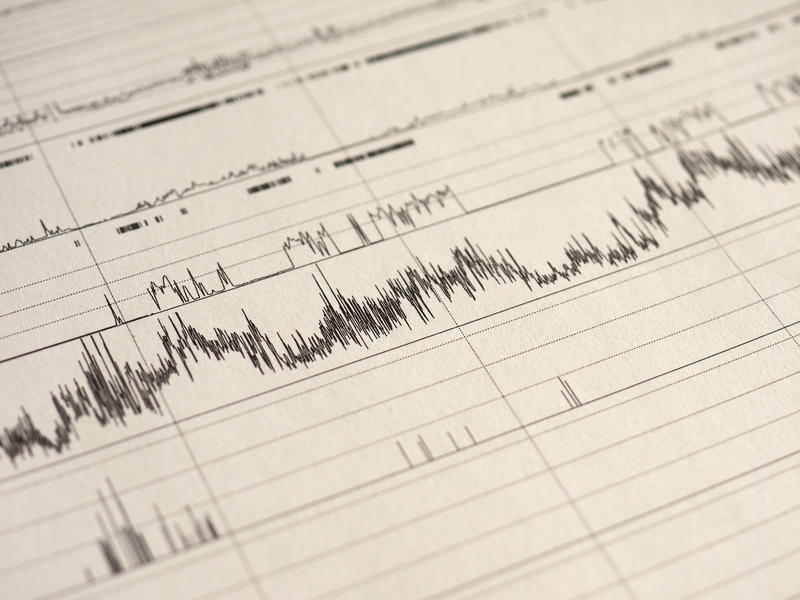
No matter whether you have bronchitis, emphysema, or any other lung condition, a sleep test will provide both you and your doctor with critically important information about your body, mind, and overall health. Using the test results and your medical history, your doctor will be able to narrow down the source of your sleep disruptions and determine if any actions need to be taken on your part to get a better night’s sleep.
Exercise Tests
Similar to how a sleep study will reveal crucial information about your breathing patterns while you sleep, an exercise test is useful for monitoring how your lungs function while undergoing physical exertion. If you have COPD, an exercise test will reveal the condition's effects on your physical abilities and help your doctor set up an exercise routine that’s right for you.
There are two main types of exercise test: laboratory tests and field walking tests. Patients who already have a chronic pulmonary condition may opt for a field walking test because they are able to stop and take a break, whereas laboratory tests are usually better for someone who still retains most of their physical abilities. Some exercise tests include the 6-minute walk test, the incremental shuttle walk test, the endurance shuttle walk test, and the cardio-pulmonary test. Your doctor will help you determine which one is best for you.
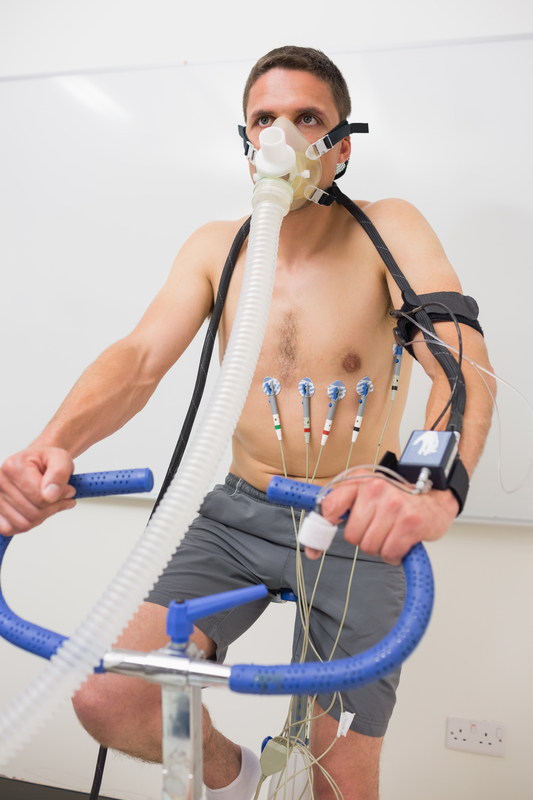
When used in tandem with a sleep study and your medical history, an exercise test will provide your doctor with a wide range of information about your overall health. For example, if your doctor discovers disruptions in your sleep pattern, he/she may be able to link it to an issue you experience while exercising or vise versa. This will make it easier to create a treatment plan that’s best for you.
Sleep Affects Your Overall Health
One of the major mistakes people make when approaching an issue like sleep apnea or sleep deprivation is that they treat it as an isolated issue. These people assume that the fatigue or restlessness that they feel is the extent of the effect it’s having on their bodies. Unfortunately, as the study suggests, this is not the case.

Aside from short-term symptoms like decreased performance and alertness, long-term sleep deprivation can put you at a higher risk for heart disease, high blood pressure, depression, and more. Chronic sleep deprivation can also significantly reduce your quality of life and put a strain on your relationships.
You’re at a Higher Risk With COPD
Above all, this study shows us that you’re at a higher risk of experiencing and being hospitalized for COPD exacerbations when you get poor sleep. Whether you’re suffering from chronic sleep apnea or you’re experiencing poor sleep due to anxiety or depression, you should take these issues seriously in order to avoid respiratory complications.

Most people tend to think of COPD exacerbation triggers as air pollutants and irritants or sicknesses like the flu or the common cold. However, according to the study, the quality of sleep you get also has an impact on when exacerbations occur and how severe they are. While COPD is manageable on its own, frequent exacerbations can take a serious toll on your health and can even be fatal.
{{cta('b59df0c1-c4de-47a8-8e1c-0d33d4b414aa','justifycenter')}}
Sleeping Disorders That Can Cause Exacerbations
Unfortunately, it’s not just poor sleep quality that increases your risk of exacerbations; sleeping disorders like sleep apnea and insomnia can also play a role while simultaneously contributing to poor sleep. Many people who have a sleeping disorder are never diagnosed because they either don’t realize they have a problem or they believe nothing can be done.
Like maintaining healthy sleep habits, diagnosing and treating sleep disorders starts with awareness. Sleep constitutes a third of our lives. And during this time, many important processes occur that are necessary for us to lead happy and healthy lives. Sure, preventing that grogginess and sleepiness when you wake up is part of it, but sleep is vital for the rest of the body as well.
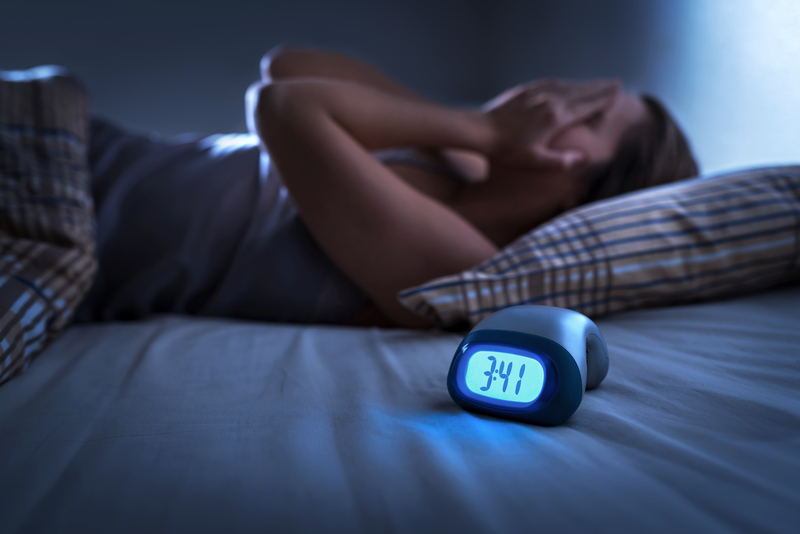
According to the Mayo Clinic, your immune system is affected by lack of sleep. Proteins called cytokines are released by the immune system when your body is experiencing inflammation, stress, or infection. However, less cytokines are produced when you’re deprived of sleep. What’s more, cells and antibodies that fight infection are reduced when you don’t get enough sleep.
As a COPD patient, getting sick could lead to a serious flare up in your symptoms and even result in exacerbations due to increased mucus production and difficulty breathing. We’re going to take a look at just a few of the most common sleep disorders so that you know when to seek help.
Sleep Apnea
Sleep apnea is a condition characterized by disrupted breathing while sleeping. There are three main types of sleep apnea that you should be aware of.
- Obstructive sleep apnea is one of the most common forms of the condition and it results when throat muscles relax and block your airways.
- Central sleep apnea is the result of the muscles that control breathing not receiving proper signals from your brain.
- Complex sleep apnea is the result of having both these conditions simultaneously.
As you can imagine, these two disorders are treated in very different ways. Continuous Positive Airway Pressure (CPAP) machines are one of the most common treatment methods for obstructive sleep apnea. Unlike a normal in-home oxygen therapy device, a CPAP machine is designed to blow at a pressure that will keep your airways open and free of obstruction while you sleep. When the device is on, it creates a cushion along the upper airway preventing the tongue, uvula, and soft palate from interfering with the airway.
{{cta('43b79c5e-6bd6-4f02-ac27-2d038d20c146','justifycenter')}}
When it comes to central sleep apnea, medication is often the only effective solution. Medication like theophylline or acetazolamide are used to stimulate breathing while you sleep. And if you’re on any opioid medications, your doctor may take you off these to prevent any complications.
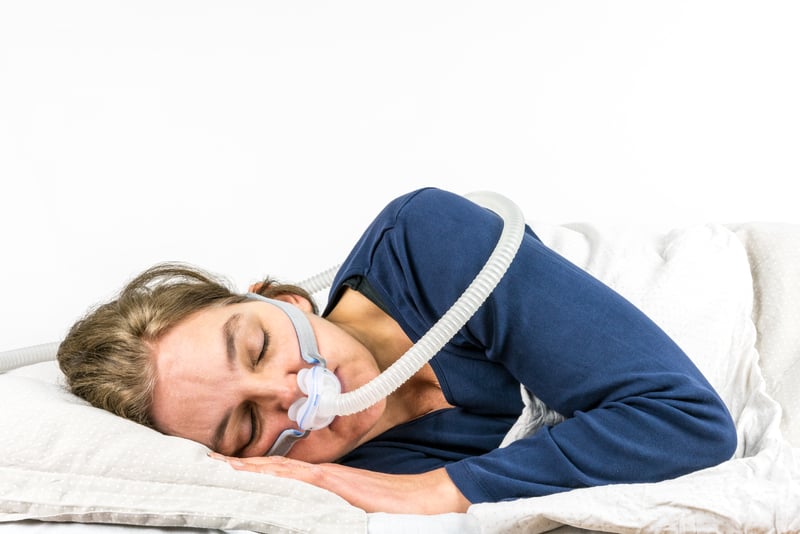
Insomnia
Insomnia is another common sleep disorder affecting around 60 million Americans. Insomnia is defined as difficulty falling asleep or feeling dissatisfied with the quality of sleep that you do get. Many people who have insomnia are unable to fall asleep even when they’re tired and often wake up feeling groggy, fatigued, and unable to concentrate.
Depending on what is causing the insomnia, both medical and non-medical treatment methods may be used. Cognitive behavioral therapy (CBT), counseling, and group therapy may be beneficial non-pharmacological treatments while relaxation techniques, breathing exercises, and changes to your sleep schedule may help as well. Medication for insomnia includes both benzodiazepine sedatives and non-benzodiazepine sedatives.
Narcolepsy
Narcolepsy is a neurological disorder that results in an irregular regulation of sleep and wakefulness. Someone with narcolepsy may fall asleep frequently during the day and may feel sudden muscle weakness as well during any type of activity. People who experience narcolepsy may also have difficulty falling asleep or staying asleep at night due to their circadian rhythm being disrupted during the day. Although this disorder usually starts at a young age, it often goes undiagnosed in many people.
Restless Leg Syndrome (RLS)
RLS results in unpleasant feelings in the legs such as aches, tingling, burning, or general discomfort. It’s considered a neurological movement disorder and is commonly associated with periodic limb movements of sleep (PLMS), which is a similar condition that occurs while the person is asleep. For some people, this condition doesn’t have a significant impact on their ability to get a restful night’s sleep. However, restless leg syndrome almost always does.
Circadian Rhythm Disorders
We’ve talked before about the importance of the circadian rhythm in managing your sleep-wake cycle and getting a good night’s sleep. And in a circadian rhythm disorder, a person’s biological clock is out of sync, especially when it comes to external time cues like the natural dark-light cycle.

Although your sleep cycle will never be completely in sync with external cues, someone with these disorders may feel completely restless and sleepy in the middle of the day and wide awake at night making it difficult to find a sleep schedule that works for them. These disorders may eventually lead to insomnia or hypersomnia (excessive sleepiness).
What You Can Do To Avoid COPD Exacerbations
{{cta('b59df0c1-c4de-47a8-8e1c-0d33d4b414aa','justifycenter')}}
Now that you understand how poor sleep quality and sleep disorders can lead to COPD exacerbations, you need to know exactly what steps you should take to avoid complications. While chronic sleep disorders and general sleepiness are dangerous on their own, for someone with COPD, they could lead to a life-threatening exacerbation. Fortunately, you don’t have to leave anything up to chance when it comes to your health and you can get started right away improving your sleep quality. Simply follow the steps below.
1.) Make A List of Your Symptoms
As you’re probably well aware, living with COPD or any chronic illness can be challenging. You may be following a strict diet, exercise routine, sleep schedule, and work schedule. And it’s easy to get confused as to what you should be doing and when. As such, the more you can write down on paper, the better.

One reason to make a physical list is because you may forget when it comes time to see your doctor. COPD has a long list of symptoms and most people with the condition experience them all at one point or another. The more information you have about what symptoms you’re experiencing and when, the better you and your doctor will be able to pinpoint what’s causing the exacerbation. On your list, be sure to thoroughly describe what symptoms you experienced, the date, the time, as well as details about your sleep schedule and sleep quality.
2.) Visit A Doctor
The second step in this process is to visit a doctor. As aforementioned, awareness is key when it comes to being able to effectively treat sleep disorders and COPD symptoms. If there’s any information about your symptoms that your doctor isn’t aware of, he/she may not be able to treat them effectively. Since COPD exacerbations are linked to your diet, sleep patterns, and overall health, you should try to provide a thorough overview of your symptoms.
3.) Don’t Be Afraid to Ask Questions
Chances are, you’re going to have a few questions about your symptoms and how your sleep quality may be affecting them — don’t hesitate to ask them. Although doctors have your best interest in mind, they aren’t infallible. There’s a chance they may have overlooked something when coming up with your treatment plan. And it’s important for you to understand your condition as well as possible after leaving the exam room.

For example, if you’re curious about sleep studies, exercise tests, or medication that you heard about online, it never hurts to ask your doctor if they might be a viable option. The worst that can happen is they suggest a better option and you become more educated about the condition you’re coping with.
Conclusion
For better or for worse, the quality of sleep you get at night affects the frequency and severity of COPD exacerbations you experience. Conversely, COPD symptoms like shortness of breath, coughing, and wheezing may prevent you from achieving a good night’s sleep. Understanding this two-way relationship is the first step in learning how to overcome it and live a healthier and more fulfilling life.
Although you will likely always experience some COPD symptoms, you can avoid exacerbations by making some simple lifestyle changes and being open and honest with your doctor. Additionally, taking the time to educate yourself on what triggers exacerbations will make it easier to manage the condition on a daily basis.
{{cta('fa8abc2a-1e88-4fa3-82fd-1cb5b9ed43b2','justifycenter')}}

